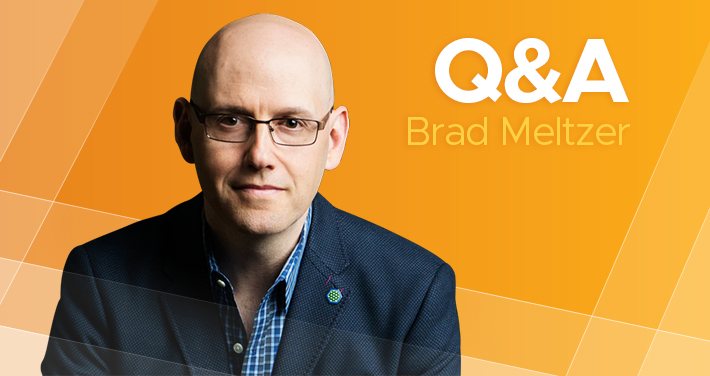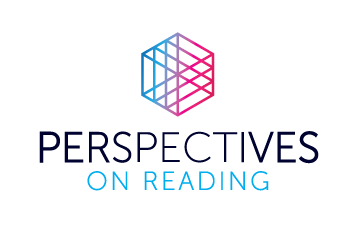Author Brad Meltzer talks inspiration, making ideas a reality

By Adam Sockel, Staff Writer | September 2020
Brad Meltzer is the type of creator who comes around once in a generation. His ability to create stories for readers of all ages is a rare gift he has crafted through years of tireless research and practice. Brad is a New York Times bestselling author of countless thrillers and mysteries. He’s written comic books, created and hosted television shows and even helped to locate the famed missing “9/11 flag” that firefighters raised at Ground Zero.
Brad has a popular children’s television series on PBS titled Xavier Riddle and the Secret Museum, based on his wildly popular Ordinary People Change the World series of books he creates with Chris Eliopoulos. These nonfiction books are meant to help children learn about real life historical figures and humanize them so kids can relate to these, at times, unapproachable characters. Perspectives on Reading talked to Brad about the inspiration for these exceptional books and how they go from idea to reality.
PoR: It’s such a rare and interesting idea to do nonfiction content for children. What made you want to start your Ordinary People Change the World series?
Brad Meltzer: My own kids. As always, I blame my children for everything. I was just tired of my own kids looking at reality television stars and people who are famous just for being famous and thinking those are heroes. And I tried to tell my daughter about Amelia Earhart and she said, “Big deal, Dad. Everyone flies across the Atlantic,” and I knew I had a problem. So, when I told my daughter about this true story of when Amelia was seven years old and built a homemade roller coaster in her backyard, my daughter was listening very carefully. The series started because I had finally found a story that my daughter was obsessed with.
PoR: Along those lines, each of the books in the series has anecdotes and stories that make these historic figures feel approachable. How do you go about finding those?
Brad Meltzer: There’s no secret way to find one of these stories. Whether it’s Abraham Lincoln standing up to bullies who were torturing turtles, Walt Disney painting on the side of his house and getting in trouble for being such a little dreamer, or Leonardo da Vinci messing up one of his first great pieces of art, I look for those small things that reveal that these people are just like us. They have flaws and failures and absurd moments. You can take any person’s life and I can say, “If you tell me about your childhood, I’ll tell you who you are.”
I’ve built my entire career on one idea: I am not that special. So, if I find a fact or story that I find really interesting, I rely on the fact that I’m not unique and hope that other people will agree with me. So, when I do research and look for these little nuggets in those people’s lives, I just look for the ones that I like best.
I know that, as a parent, I’m not alone. There are countless parents out there who want better heroes for their children. They want their kids to learn about decency and kindness and resilience.
Hear Brad discuss the importance of children’s books on The Professional Book Nerds podcast:
PoR: At this point, there is a massive list of these stories you’re working on. I know people request specific ones all the time, but when you first started out, how did you decide on which historic figures to highlight?
Brad Meltzer: I just went for who I wanted my kids to learn from. Amelia Earhart and Abraham Lincoln were the easiest to start with, to me, because they’re the most iconic. Rosa Parks and Albert Einstein. These aren’t exactly controversial choices. Once those four were done, I really just looked at my own children.
My son is obsessed with sports, but I see him seeing these millionaires today making fools of themselves on social media every day. So I said, “Want to see what a real hero looks like? Meet this guy!” and I wrote I am Jackie Robinson.
I wrote I am Lucille Ball because I wanted my daughter to have a female entertainer to look up to who wasn’t famous just for being thin and pretty. Lucille stood for the idea that it’s okay to be different.
For my youngest, who is my little dreamer and has trouble focusing but has the most amazing dreams, I wrote I am Jim Henson and I am Walt Disney. I know it sounds silly, and obviously there are other factors, but Chris (Eliopoulos) and I have always started with our own kids and gone from there.
PoR: Did you have any inkling when this started that these books would be used by students and teachers in classrooms or would become a TV show?
Brad Meltzer: Not at all. This was a side project we were doing completely for our own children. It was solely just to entertain our kids and give them something a little better to focus on than what they’re seeing on the internet. We had no idea how it was going to be embraced by teachers and librarians. They were the very first ones to jump on it, and then they gave it to parents. We had no idea it was going to explode like it did.
It’s pretty amazing to see parents online say they bought the first ones and say, “I thought we were the only ones!” We also happened to get the timing correct. When the 2016 election was entering its final months and Hillary Clinton and Donald Trump were arguing every night on television, something amazing happened with our series. Two books were wildly outselling the others. I am Martin Luther King Jr. and I am George Washington. It wasn’t a Democratic or Republican thing. There were parents and grandparents on both sides who were tired of turning on the TV and seeing politicians, when what they wanted their children to see were leaders. We clearly see today that there is a huge difference between a politician and a leader. We just happened to be in that spot when Trump was elected that parents were searching for better examples of leadership for their kids.
PoR: Have you looked at any people that you planned to profile that, after research, you decided might not be a good idea?
Brad Meltzer: There were a couple, but the main thing is that this has never been a history series for me. It’s been a moral series. On the back of every book there is a moral that you’ll find within. That’s always been the goal. Not to show you a bunch of dates and facts, but to show you how people actually are and how they actually live. They have flaws and faults along with all of their accomplishments.
I truly believe this book series is where I get to be my most honest self. I don’t worry about sales or the marketing. My only worry is giving something good to my kids. The purity of that has driven this series. Any other book, I’ll put my business hat on, but not these. This is my soul in book form.
PoR: Do you think this is a better way of teaching history than simply showing dates and facts on a sheet of paper? By explaining how these people relate to our life even today?
Brad Meltzer: I was a history major, and I never cared about just the dates and facts. I cared about the people and the stories. My kids were the same. They didn’t care about the dates and facts, but when I told them who these people were when they were 10 years old, their eyes lit up. It wasn’t my grand design. It was just seeing how my kids reacted when we got to the good parts.
This interview has been condensed for length and lightly edited for clarity.


